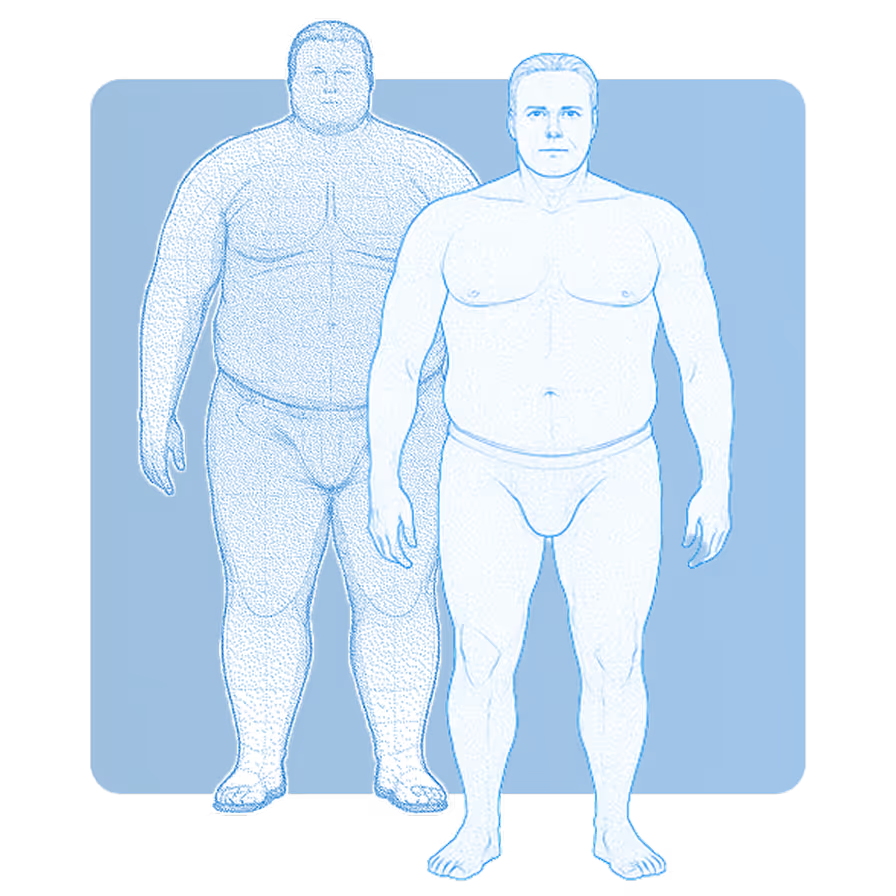A weight loss program for men who’ve tried it all









Best price for weight loss, no hidden extras

Member stories
Better tools for
better health
Lose the weight

Keep it off

Kicking off a healthier
future
You’re about to go through a pretty dramatic shift in your day-to-day life. But with the treatment helping you to make the right choices, the biggest challenge is just taking the first step.
Begin treatment and begin to adjust to a new way of thinking about food. Some mild side effects can be expected, so feel free to check in with your practitioner with any concerns.

By now many patients feel locked into a new schedule. You might've not been able to finish your usual servings over the past few weeks and have greatly reduced your portion sizes accordingly.
The scales can reflect your decreased intake.

The treatment is second nature and your relationship with food might feel dramatically different to what it was three months ago. Results may be noticed by friends and family, and felt through increased mobility and comfort in your body.


Feel the change in 30 days or your money back
If the program is not right for you, get in touch within the first 30 days of receiving treatment and we'll refund you the full amount.
*T&Cs apply.
Is medical weight loss cheating?
“We hear a lot about how medical weight loss is cheating, it’s a cheap shortcut, it’s for lazy people.
The truth is, most people who want to lose weight try anything they can, but many programs don’t work or aren’t sustainable for everyone.
What medical weight loss offers is a fair go at better health.
It’s the momentum to get to a place where exercise is manageable and maintaining a healthy diet isn’t a constant battle.”

Dr Matt Vickers, Specialist GP
How Pilot works

Online assessment

Discreet, free shipping

Ongoing care
Success stories from Pilot patients
FAQs
.svg)
Due to Australian therapeutic goods regulations, we are unable to list this class of treatments by name.
You can learn deeper specifics about treatment during the health practitioner consult stage on Pilot.
We can say that they’re widely used and can be effective for regulating your metabolism and hunger hormones.
.svg)
The class of treatments available in the program will be named and fully explained during your health practitioner's consult (due to advertising regulations we are unable to name them before this).
They are widely used and are generally very well tolerated, with minimal side effects (the main one being nausea for some patients).
For anyone with a personal or family history that might put them at a slightly higher risk for extremely rare side effects, your health practitioner will always err on the side of caution and recommend other options in those situations.
.svg)
The cost of this program (including the treatment plan, health practitioner support, and ongoing behavioural coaching) starts from $349 a month.
Start from just $199 on your first month* when you stack a Bulk Buy Program with code START50. This price includes the treatment plan, health practitioner support, and ongoing behavioural coaching.
.svg)
Our program introduces hunger regulating treatment, and combines it with health coaching so you can learn about your body while also losing a substantial portion of your body weight.
.svg)
No. We don't force you to follow an eating plan, but your health coach will be helping you make healthier food and lifestyle choices through targeted behavioural changes.
.svg)
That's fine, you don't have to be best mates with them. Your health coach will still want to check in on your progress - get your weight, waist measurement, and motivation levels. If you aren't comfortable sharing this with the group, then this can be shared directly with your health coach - no problems.
.svg)
No, definitely not. Although Pilot is a male-oriented platform, the treatments are effective for men and women. and start the Weight Reset Program with Pilot.
.svg)
The most common side effects observed by those on Pilot’s weight loss program are nausea, diarrhoea, and constipation. In many cases these side effects diminish over time when patients grow more accustomed with the treatment.






























